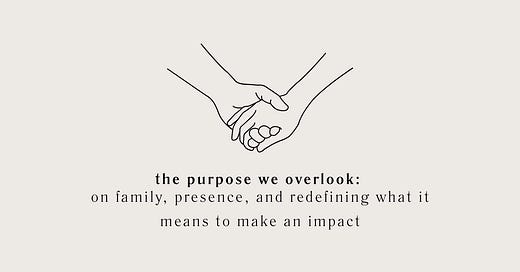Last month, my sister experienced a life-threatening medical emergency.
I was in New York for the first time in four months, back for a family wedding. My parents and I had just pulled into the wedding venue when her boyfriend called us with words no one ever wants to hear:
“You need to come to the hospital. Now.”
The next 90 minutes were a blur – full of panic, prayer, and frantically Googling her symptoms while playing devotional music and practicing distance reiki in the car. I don’t wish that level of stress, uncertainty, or fear on anyone. Once we arrived at the hospital, the night unfolded into a mix of agony, panic, and tiny, flickering moments of hope. Her condition severely worsened before it stabilized.
For the next few days, we played visitor tag team – showing up to the hospital with snacks, positive energy, and whatever morsels of strength we could gather for her and each other.
She’s recovering now. We’re deeply grateful. But that moment shifted something in me. It cracked open a new understanding of “purpose.”
Not the kind sold in TED talks or self-help books. Not the kind that requires a website, a five-year plan, or a personal brand.
A quieter kind of purpose – rooted in presence. In how we show up for one another. In being a good daughter, sister, friend, neighbor. In service that isn’t performative. Support that doesn’t need to be seen.
In the days that followed my sister’s hospital discharge, our community members showed up in meaningful ways: visiting my sister on bedrest, cooking meals without being asked to do so, checking in on each of us personally.
We live in a culture that sells “finding your purpose” as something external. As something you need to unlock or monetize. And I’ve spent most of my adult life chasing that kind of purpose – big, world-changing, legacy-building impact. That is a privilege, and one I don’t take lightly.
But sometimes, the most profound thing you can do is simply be there.
Hold space. Offer your energy. Be someone’s safe place. Give without expecting anything in return. These, too, are noble pursuits. These, too, are world-changing – just on a smaller, more intimate scale.
It’s not lost on me that every Eastern and Indigenous tradition emphasizes this. In Buddhism, we call it sangha – the spiritual community. The village. The people who hold you up and whom you hold up in return.
Maybe the best way to make an impact is to create ripples. First within yourself. Then within the people closest to you. And maybe that’s enough.
We overcomplicate impact. But the truth is, showing up is the work.





Yes! I whole heartedly support - charity begins at home 🏠💖